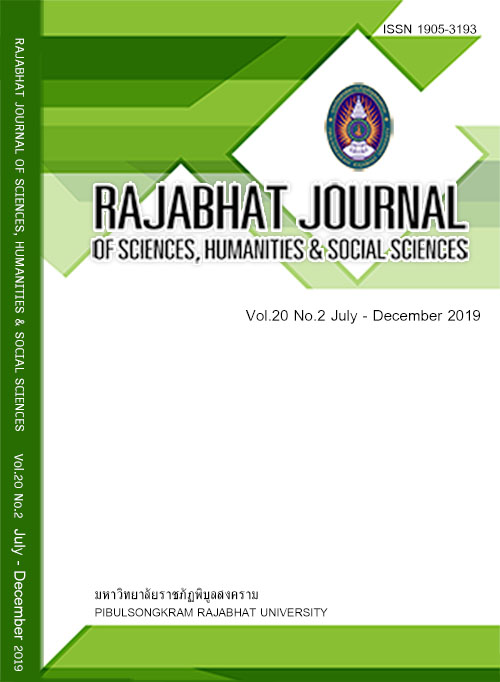THE ADAPTATION OF 21ST CENTURY FOLK HEALERS OF TAI DAM ETHNIC GROUP IN NORTHERN THAILAND
Keywords:
adaptation, folk healers, Tai Dam Ethnic Group in Northern ThailandAbstract
This qualitative research aimed to study the adaptation of folk healers in health care of Tai Dam ethnic groups in northern Thailand. The study was conducted during January – December, 2018. The data were collected using structured in-depth interview, observation, and focus group discussion. Key informants were Mor Yuang, Mor Mod Mont, Mor Sean, community leaders, and people in Phitsanulok and Phichit provinces. The results found of this study Tai Dam ethnic groups this study had migrated from Phetchaburi province nearly 100 years ago and almost their social status are Phunoi. Basically, they believed and allied in ghosts by believing that ghosts influence the way of life from birth to death and the system of thinking about illness thus still maintaining the culture, traditions and rituals that are bound to the beliefs about ghosts that are still present. Changes in the social context occurred in the 21st century bring the adaptation of folk healers including the beliefs and the system of thinking about the illness have been changed with a more scientific thinking system and obviously discarded from ghosts. The folk healers assented to Buddhist principles and applied in their life. In addition, they accepted other Gods in various religions which believed in ghosts. The age of the folk healers who were able to ritual were more flexible. The role of the folk healers were changed, they were the culture capitals as the well-informed person, the healer, and the communicator among Tan, ghosts and human by using the traditional ritual of Tai Dam ethnic group. Nowadays, the role of a folk healers exist for the care of illness in the mental and social dimensions and they maintain their status as people who is perform the ritual for retaining cultures, traditions and the way to believe in ghosts.
References
Charoenpanich T. Ghosts and power: Through ghosts believing of Thai Song Dum, Tambon Pun Sao, Bang Ra Gum, Phitsanulok. Ratchaphruek Journal. 2016; 14(2): 67-74.
Chantachon S. Cultural Qualitative Research: The Research Institute of Northeastern Art and Culture. Mahasarakham University, Mahasarakham; 2006.
Chuengsatiansup K. Medical Pluralism and Health Culture. Bangkok: Princess Maha Chakri Sirindhorn Anthropology Centre (Public Organisation); 2006.
Kulsomboon S. Research report Status and Direction of Research on Folk Wisdom in Health. Regional Medical Office Department of Development, Thai Traditional Medicine and Alternative Medicine Ministry of Public Health, Nonthaburi. 2007.
Meanchanchei R. Cultural capital of the Thai Song Dam and Transformation of the Community. Academic Journal. 2013; 12(2): 175-202.
Meanchanchei R. Cultural Capital of the Thai Song Dam and Transformation of the Community in Nakhonpathom Province. Veridian E-Journal, Silpakorn University (Humanities, Social Sciences and Arts). 2015; 8(2): 231-247.
Photisita C. Paradigm and Process of Qualitative Research. 3rd ed. Bangkok: Amarin Printing & Publishing Public Co., Ltd. 2007.
Phosan A. The Essence, Beliefs and Beliefs of Lao Song. Department of Religion and Philosophy, Faculty of Humanities and Social Sciences, Mahasarakham University, Mahasarakham. 2009.
Rapeephat A. Culture as (public) meaning Clifford Geertz theory. Bangkok: Princess Maha Chakri Sirindhorn Anthropology Centre (Public Organization). 2008.
Srimhaksuk K. & Boonkerd B. An anlysis of the factors of existence and change on beliefs in Thai Song Dam people’s rites: A case study in the area of Nongprong sub-district, Khaoyoi district, Phetchaburi Province. Journal of Humanities and Social Sciences Burapha University. 2016; 24(44): 83-102.
Thammawimuti A. & Siriwong P. Thai Song Dam Identity Maintenance: Discursive Practice to Strong CommunityBuilding of Hua Kao Jeen Village. Veridian E-Journal Silpakorn University. 2008; 10(1): 1552-1571.
Wisungre S. Klumkool S, Duenngai K. et al. Folk Wisdom of Healers in Mueang, Phetchabun Province. Rajabhat Journal of Sciences, Humanities & Social Sciences, 2018; 19(1): 131-137.
Downloads
Published
How to Cite
Issue
Section
License
Each article is copyrighted © by its author(s) and is published under license from the author(s).









